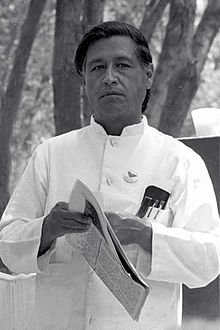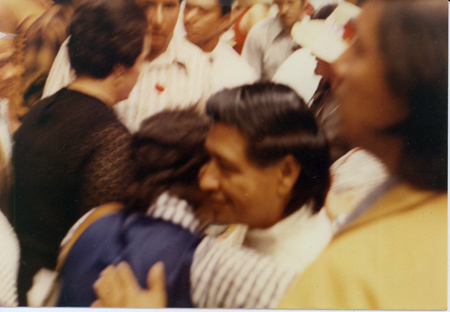
Today César Chávez’s birthday, March 31, is celebrated in California, Colorado, and Texas as a state holiday, intended to promote service to the community in honor of Chávez’s life and work. He died in 1993 at age 66.
Chávez co-founded the National Farm Workers Association (NFWA) with Dolores Huerta. It was later called the United Farm Workers (UFW). When I was going to theological seminary in 1971-74 I became involved as a union organizer. This was about the time of the grape boycott (which eventually succeeded) and Attorney General Bobby Kennedy providing direct personal support.
Most of those working in the fields were families. Mom and Dad of course, often an elderly mother and frequently children. Even with all of them working they could barely survive on the wages at the time. I remember with tears in my eyes watching a 75 year old grandmother squatting in the middle of an open field with no cover urinating in public because there were no bathrooms or tented areas for privacy.
Regardless of your view of modern unions, the UFW was an amazing organization. Totally non-violent, fighting for causes like porta potties in the fields where they worked, two breaks during a hard physical outdoor with no shade 10 hour day, adequate tools – and a basic $1.25/hr wage (The federal minimum wage at the time for other workers was $1.60). It’s hard today to remember how bad the working conditions were.
I spent many weeks in fields watching the “authorities” fire shotguns and routinely arrest people, like me, for simply picketing and asking for better working conditions. I’m sure there were many good farmers in those fields, but unfortunately they mostly choose to remain silent.
I never saw the Union spend one cent on fancy things. Cesar took no salary. My organizers salary was $5 a week. We slept on church wooden floors. Great men like Fred Ross Jr. helped teach the Union volunteers how to do grassroots, door-to-door, house meeting organizing which built the movement in communities from the ground up.
If you question the movement please feel free to write to me personally and I’ll be glad to have a dialog with you. Was it perfect, of course not. Was there a lot of internal conflict, correct. In the end was it a righteous cause, definitely.
César (his first name was actually Colegio but he went by his middle name) and his wife Helen spent the night at our communal home in Altadena, California in 1972. He was visiting to support the Los Angeles organizers and as was usual with him, he did not stay in fancy hotels but slept at friends simple homes. His sons spent the night outside guarding our house, a normal routine because of the constant death threats. We offered him dinner but he only wanted an apple (he was a vegan). Three of us spoke with him for several hours learning more about his goals and strategies for achieving those, and how we could help. A truly memorable evening.
I eventually did direct work for him at his office in Delano and in the late 1970s saw him again several times at the Center for Employment Training in San Jose, California where I was working. He was one of the most humble, sincere, and kind people I’ve ever seen.
In 1973 the UFW held it’s first convention in Fresno and I was a minor player in helping organize that with Joan Baez who was active in the movement. Found a couple of pictures of that time.

I’m glad to see there is a new movie about him, haven’t seen it yet. But I doubt it will convey the “grit” of what it was like on a daily basis. It was extremely difficult hard work. I was honored to know him. Sí, se puede! (Spanish for Yes, it can be done).
If you have problems seeing the video below click HERE
youtube::REHiLryR1oE::
If you have problems seeing the video below click HERE.
youtube::bUz7tzKCTR4#t=19::


